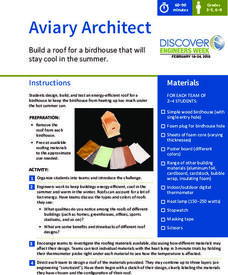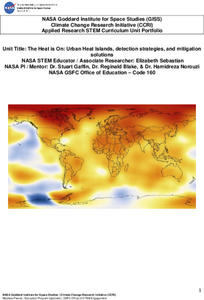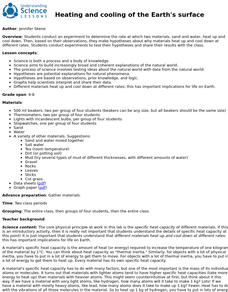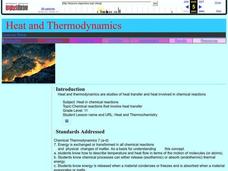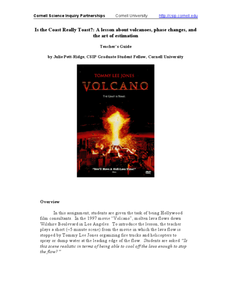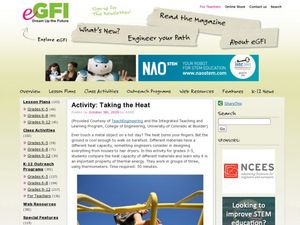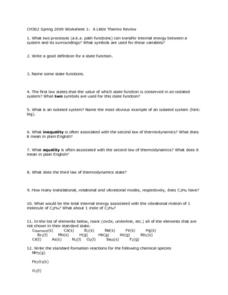Rice University
College Physics for AP® Courses
Take a look at an organized physics course. The 34-section electronic textbook covers material in AP® Physics 1 and 2. Teachers use the text to supplement lectures and have the class work through the labs. Each section contains...
Curated OER
2007 U.S. National Chemistry Olympiad Local Section Exam
Sixty multiple choice questions cover the entire gamut of chemistry concepts. This is the local section of the U.S. National Chemistry Olympiad, where your chemistry candidates take a shot at entering the national competition. They...
Curated OER
2000 U.S. National Chemistry Olympiad National Exam - Part I
The National Chemistry Olympiad exams are comprehensive tests covering an entire year of chemistry concepts. You can use them as practice for competing in the challenge, or simply as a review, or as an actual final exam for your...
DiscoverE
Aviary Architect
Groups of two to four work collaboratively to engineer a birdhouse that will stay cool in the summer heat. Teams examine several different-colored roofs, testing the efficiency of each with a heat lamp. Then, groups sketch their ideas,...
NASA
The Heat is On: Urban Heat Islands, Detection Strategies, and Mitigation Solutions
It's sure getting hot out there! Scholars analyze satellite data on land use and surface temperatures, and then learn how to ground truth satellite data through an activity. They apply technology to identify urban heat islands and...
University of California
Heating and Cooling of the Earth's Surface
Scholars collect data from heating sand and water before forming testable hypotheses about why sand heats up faster. Afterward, they develop and run experiments to test their hypotheses.
Kenan Fellows
What Is Heat?
If objects have no heat, how do they can gain and lose it? Scholars experiment with heat, temperature, and specific heat of various substances. They create definitions for these terms based on their own conclusions to complete the fourth...
Chemistry Collective
Virtual Lab: Measuring the Heat Capacity of an Engine Coolant II (Advanced Version)
Cool it! A virtual lab has users conduct an experiment to find the specific heat capacity for an unknown substance. The substance is an engine coolant, and calculating the specific heat capacity lets learners determine if it is a better...
Chemistry Collective
Virtual Lab: Measuring the Heat Capacity of an Engine Coolant
Combine automotive science with chemistry! Young scholars investigate an alternative to the traditional engine coolant. They mix the chemicals virtually and collect data to determine the specific heat capacity.
Colorado State University
Why Can Warm Air "Hold" More Moisture than Cold Air?—Vapor Pressure Exercise
Does it feel a little humid in here? Learners assume the role of water vapor in the atmosphere as they explore the differences between warm and cold air. They roll dice to determine their level of energy, which determines if they...
Space Awareness
Water is a Heat Sink
One of the key objectives of Europe's Copernicus Earth program is to monitor the temperatures of the oceans and seas on Earth. Young scholars learn the effects of different heat capacities through two experiments. These experiments...
Space Awareness
Oceans as a Heat Reservoir
Oceans absorb half of the carbon dioxide and 80 percent of the greenhouse gases released into the atmosphere. Scholars learn how and why the oceans store heat more effectively than land and how they help mitigate global warming. Pupils...
It's About Time
What Drives the Plates?
It's getting hot in here! Lead your emerging geoscientists on a thrilling journey as they calculate liquid densities to determine forces that stimulate thermal plates from within the earth's crust. They explore effects of temperature on...
Virginia Department of Education
Heat Transfer and Heat Capacity
It's time to increase the heat! Young chemists demonstrate heat transfer and heat capacity in an activity-packed lab, showing the transitions between solid, liquid, and gaseous phases of materials. Individuals plot data as the...
Curated OER
Heat and Thermodynamics
This is actually a 10-day mini unit on thermal energy for your high school chemists. Every avenue is taken to get learners absorbed in heat: a pretest, a PowerPoint presentation, Internet exploration, demonstrations, lab activities, and...
Curated OER
Is the Coast Really Toast?: A Lesson About Volcanoes, Phase Changes, and the Art of Estimation
Clever! Use a clip from the 1997 film, Volcano, to get your chemistry class knee-deep in heat concepts related to lava. In the movie scene, lava flow is stopped in the nick of time. Your class must use calculations to determine if this...
Curated OER
Version 001 - Quiz 1
The phase diagram tops this chemistry quiz. Junior scientists answer eight multiple-choice questions as they analyze it and make calculations regarding the heat of vaporization.
Curated OER
Properties of Fresh and Sea Water
Students work with three stations to demonstrate the properties of water. They explore water's boiling point, freezing point, and its ability to store heat.
Curated OER
Version 001 – Exam 1 – David Laude (53015) 1
A 30-question multiple choice chemistry test challenges takers. Topics touched upon include thermochemistry, equilibrium, behavior of gases, and pH. Problem solving is required in order to answer most of the questions. Other questions...
Curated OER
Chemistry: Heat Energy Problems
Seven chemical systems are presented. Chemistry kids calculate the final temperature of each system using specific heat capacity of the involved substances. You will need to provide a specific heat capacity table in order for learners to...
Curated OER
Taking the Heat
Learners measure the heat absorbed by different materials and learn why engineers need to know how different materials story thermal energy when designing buildings. In this heat capacity lesson plan, students use a thermometer to...
Curated OER
Calculating Joules
In this calculating joules worksheet, learners read about the relationship between mass, temperature change, specific heat and energy. They find the number of joules needed to heat water in five different problems using the given...
Curated OER
Thermodynamics
In this thermodynamics activity, learners review the first law of thermodynamics and define enthalpy, state functions, and heat capacity. Students use Hess' law and heats of formation to solve reactions. This activity has 30 problems to...
Curated OER
A Little Thermo Review
In this thermodynamics activity, students define and give examples of state functions. Students review the laws of thermodynamics. Student determine the standard formation reactions for given chemical species. This activity has 10 short...





